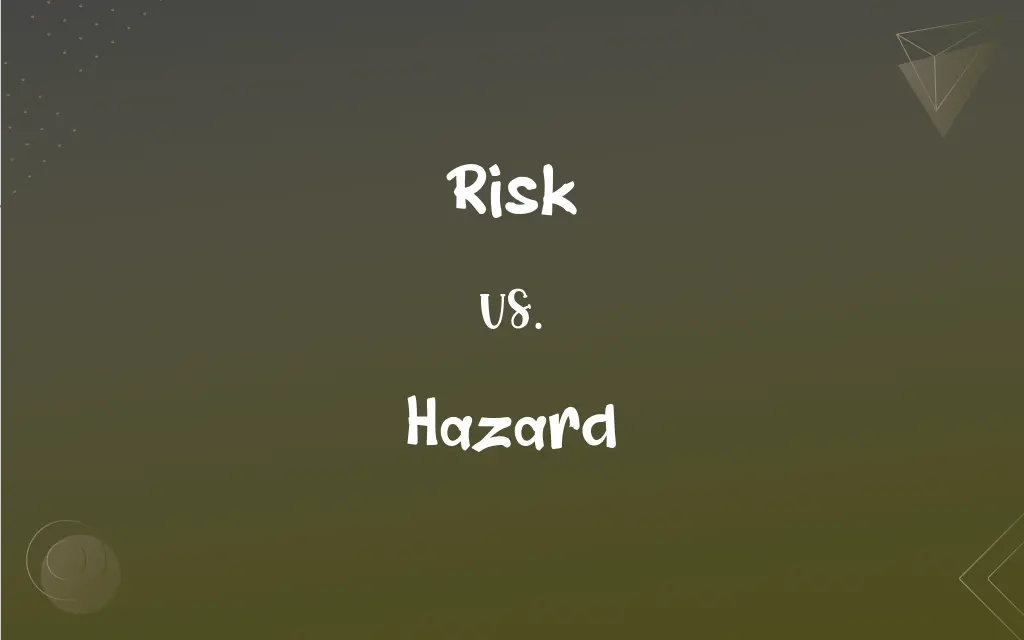Risk vs. Hazard: What's the Difference?
Edited by Janet White || By Harlon Moss || Updated on October 23, 2023
A "risk" refers to the potential for harm or loss, while a "hazard" is something that can cause harm.

Key Differences
A "risk" in various contexts generally signifies the potential or possibility of something undesirable occurring. It embodies uncertainty and does not guarantee an adverse outcome but rather suggests its potentiality. For instance, when investing in stocks, there's always a risk of losing money due to market fluctuations.
On the other hand, a "hazard" denotes something that can cause harm, damage, or adverse effects. It represents a tangible or intangible source of danger. For example, in a workplace setting, a wet floor might be considered a hazard since it can lead to slips and falls.
While both "risk" and "hazard" are used in discussions about safety and potential harm, it's essential to note the nuanced difference. A hazard is the direct source or cause of potential harm, while risk quantifies or describes how likely that harm is to occur because of the hazard. To illustrate, using the wet floor example, the risk of injury might be high if the floor remains wet and unattended, but the hazard remains the wet floor itself.
In practical applications, especially in fields like safety management, recognizing hazards is the first step. Once identified, professionals assess and manage the risks associated with those hazards, devising strategies to minimize or eliminate potential harm.
To summarize, while both terms pertain to potential harm or damage, "risk" speaks to the likelihood or chance of that harm occurring, whereas "hazard" identifies the direct cause or source of potential harm.
ADVERTISEMENT
Comparison Chart
Definition
The potential for harm or loss
Something that can cause harm
Nature
Intangible, represents likelihood
Tangible or intangible source of danger
Context of Use
Often used in financial, health, and safety contexts
Primarily used in safety and health contexts
Dependence
Depends on the presence and characteristics of a hazard
Independent, exists as a potential source of danger
Outcome
Uncertain, suggests potentiality
Direct cause of potential harm
ADVERTISEMENT
Risk and Hazard Definitions
Risk
A situation involving exposure to danger.
Skydiving is a high-risk activity.
Hazard
Anything that can cause harm or damage.
Chemical spills are a major environmental hazard.
Risk
The potential for a negative outcome.
There's a risk of rain tomorrow.
Hazard
A danger or risk.
The old building poses a fire hazard.
Risk
Exposure to the chance of injury or loss.
Investing always involves some risk.
Hazard
A potential source of harm or adverse effect.
Loose electrical wires are a hazard.
Risk
The uncertainty of a result, event, or outcome.
There's a high risk of failure if we don't prepare.
Hazard
A potential cause of unwanted incidents.
Wet floors are a slip hazard.
Risk
The likelihood of an adverse event occurring.
There's a minimal risk of side effects from the vaccine.
Hazard
Something causing inevitable danger or risk.
Smoking is a health hazard.
Risk
The possibility of suffering harm or loss; danger.
Hazard
A chance of being injured or harmed
Space travel is full of hazards.
FAQs
Are risks always negative?
Typically, risks denote negative outcomes, but in finance, "risk" can also refer to potential rewards.
Is every hazard associated with a risk?
Yes, every hazard has associated risks that quantify the potential for harm.
Is a hazard always harmful?
A hazard has the potential for harm, but harm is not guaranteed.
Can the risk level change over time?
Yes, as conditions change, the associated risk can increase or decrease.
Why is it important to differentiate between risk and hazard?
Differentiating helps in effective safety management – identifying hazards and then assessing and managing associated risks.
How do professionals manage risks and hazards?
Through processes of identification, assessment, control, and regular review.
Can there be a positive risk?
In business contexts, "risk" can refer to opportunities, but generally, risks are viewed as potential negatives.
Can a hazard be completely eliminated?
Some hazards can be eliminated, while others can only be controlled or minimized.
Are risks always tangible?
No, risks can be intangible, like reputational risks or data security risks.
Are risk and hazard synonymous in everyday language?
They can be used interchangeably in casual conversations, but technically, they have different meanings.
Can risks exist without hazards?
No, risks stem from hazards and depend on their presence.
How can risks be managed?
Risks can be managed by eliminating or controlling the associated hazards.
Are all hazards immediately obvious?
No, some hazards, like toxic fumes, may not be immediately noticeable.
How are risk levels categorized?
Typically as low, medium, or high, based on likelihood and impact.
Can one mitigate a hazard without affecting its associated risk?
Mitigating a hazard will typically reduce or alter its associated risk.
How do industries prioritize which risks to address?
They often prioritize based on severity, likelihood, and potential impact.
Are risks constant or do they evolve?
Risks can evolve based on changes in associated hazards and the environment.
Does every industry face risks and hazards?
Yes, though the nature and severity of risks and hazards can vary by industry.
Can multiple hazards contribute to a single risk?
Yes, multiple hazards can increase the overall risk of a particular adverse event.
Is "risk assessment" the same as "hazard identification"?
No. Hazard identification is the first step, followed by risk assessment, which evaluates the likelihood and impact of harm.
About Author
Written by
Harlon MossHarlon is a seasoned quality moderator and accomplished content writer for Difference Wiki. An alumnus of the prestigious University of California, he earned his degree in Computer Science. Leveraging his academic background, Harlon brings a meticulous and informed perspective to his work, ensuring content accuracy and excellence.
Edited by
Janet WhiteJanet White has been an esteemed writer and blogger for Difference Wiki. Holding a Master's degree in Science and Medical Journalism from the prestigious Boston University, she has consistently demonstrated her expertise and passion for her field. When she's not immersed in her work, Janet relishes her time exercising, delving into a good book, and cherishing moments with friends and family.































































